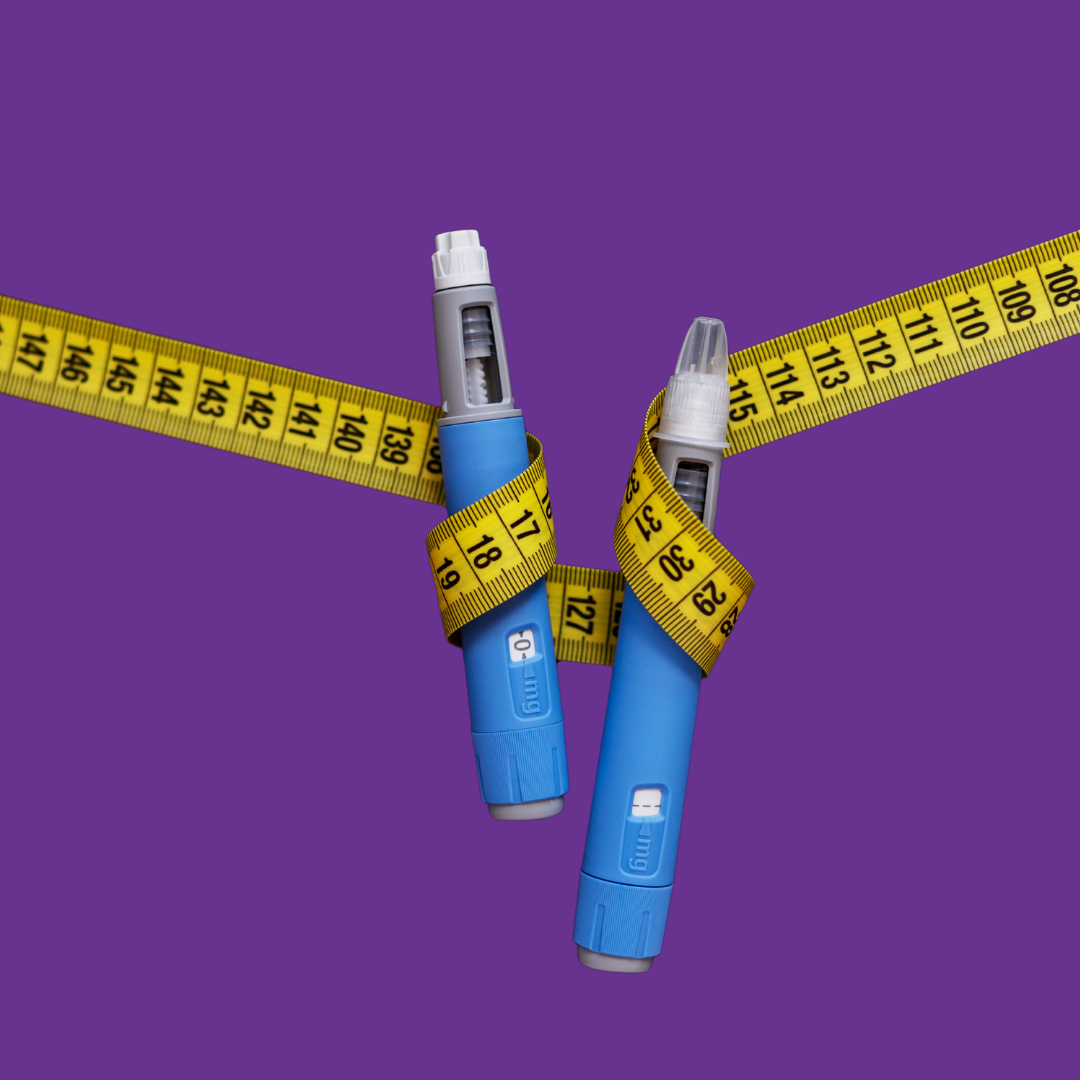Perimenopause and menopause often bring an array of troublesome symptoms to the daily lives of women; one of these being weight gain and/or the inability to lose weight like we could when we were younger! Nutritional changes, exercising, and menopausal hormone therapy can help, but what happens when you need more? Read below to learn about the newest options in obesity medication and the promising results the studies have shown! Conveniently, these medications are offered and managed by your menopause clinicians at MyMenopauseRx!
What is a GLP- 1 Agonist and how do they work?
GLP-1 Agonists (Glucagon-like peptide-1 receptor agonists) have been around for many years! They were first developed for the treatment of Type 2 Diabetes but over time it was found these medications also promoted weight loss.
GLP-1 medications work in several different ways to promote weight loss: 1) by mimicking a naturally occurring GLP-1 hormone in our GI tract, which in turn regulates our insulin and blood sugar levels, 2) by acting in the area of the brain that regulates our hunger cues, and 3) slows stomach emptying which results in feeling fuller for a longer period of time.
Currently, there are 3 GLP-1 agonists that are FDA-approved for the treatment of obesity:
Saxenda (Liraglutide)- a once-daily subcutaneous injection given in the back of the arm, the thigh, or the abdomen. When used along with lifestyle changes, you may expect to lose 5-10% of your body weight.
Wegovy (Semaglutide)- a once-weekly subcutaneous injection given in the back of the arm, the thigh, or the abdomen. When used along with lifestyle changes, you may expect to lose up to 16% of your body weight.
Zepbound (Tirzepatide)- a once-weekly subcutaneous injection given in the back of the arm, the thigh, or the abdomen. When used along with lifestyle changes, you may expect to lose up to 20% of your body weight.
Do I qualify for a GLP-1 Agonist?
Not everyone who desires a prescription treatment for weight loss qualifies for a GLP-1 agonist. It is important to discuss your complete medical history with your MyMenopauseRx clinician to determine your eligibility for the medication.
Currently, the FDA guidelines state that to be considered for a GLP-1 agonist, individuals must have:
- A BMI of 30 or greater OR
- A BMI of 27 or greater with at least one weight-related comorbidity (i.e. high blood pressure, high cholesterol, Pre-Diabetes, cardiovascular disease)
It is worth noting that medication should be used in conjunction with lifestyle changes such as healthy eating and physical activity to set you up for a successful journey long term!
Individuals with a personal or family history of Medullary Thyroid Cancer or Multiple Endocrine Neoplasia Type 2 (MEN 2) should not take a GLP-1 agonist. Similarly, those who have a personal history of pancreatitis should also avoid taking these medications.
What are the possible side effects associated with taking a GLP-1 agonist?
It is important to be aware of the possible side effects you may experience while taking these medications. Common side effects may include nausea, vomiting, diarrhea, constipation, fatigue, and acid reflux.
More serious side effects, although less likely, may include low blood sugar (Hypoglycemia), Kidney impairment, elevated heart rate, inflammation of your pancreas (pancreatitis), inflammation of your gallbladder or gallstones (Cholecystitis/Cholelithiasis), bowel obstruction, and suicidal ideations.
We recommend you bring up any side effects you may be experiencing so we can help get you feeling your best! Your MyMenopauseRx clinician partners with you on your weight loss journey and will meet with you every 4 weeks while on the medication.
What if I do not qualify for a GLP-1 agonist or my insurance does not cover these medications?
Don’t worry! Here at MyMenopauseRx, we have several other treatment options to offer you to help with your weight loss journey. Some of these options include Contrave (Naltrexone HCL/Bupropion), Bupropion XL (Wellbutrin), and Metformin XR. Your clinician will work closely with you to determine the medication that suits you best.
Should I Use Compounded Semaglutide or Tirzepatide Instead?
If you’ve scrolled social media anytime over the last several months, I am sure you have seen ads for Compounded Semaglutide or Tirzepatide at “half the cost!” While it may be frustrating to find out you are not covered for a GLP-1 medication, the MyMenopauseRx clinical team always makes your safety our priority! We follow the Obesity Medicine Association Position statement recommendations on Compounded peptides, which recommends that all anti-obesity medications go through clinical testing for safety and efficacy as overseen by the FDA. Compounded medications are not required to go through the same clinical testing processes overseen by the FDA. Since their safety, efficacy, and purity cannot be confirmed, we prescribe FDA-approved GLP-1’s here at MyMenopauseRx. We recommend discussing concerns about insurance coverage or medication availability with us so we can come up with a treatment plan while keeping your safety a priority!
Weight loss is no easy task, especially in our midlife. You are not alone!
Schedule an appointment today with one of our clinicians at MyMenopauseRx to get started on your weight loss journey. We are here for you and are excited to be a part of your journey to better health!





